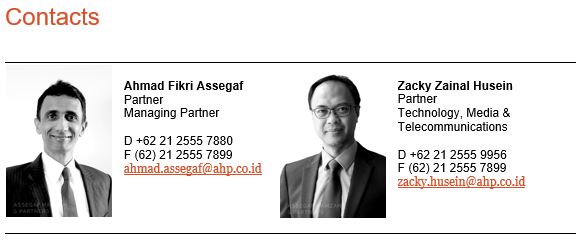The Government’s Effort To Regulate Over-The-Top Services
In the much anticipated move following the Netflix and transport applications’ debacles, the Minister of Communications and Informatics (“MOCIT”) on March 31, 2016 issued Circular Letter No. 3 of 2016 (“CL”) which aims to give a glimpse of how the Government is thinking about the topic prior to enacting the ‘regulation’. Two considerations were cited as to why the CL was issued. First, as an advance warning of the upcoming regulation (Note: no draft of the said regulation is attached to the CL). Second, to provide ample time for the service providers to prepare, i.e. any adjustments to their business operations (Note: no deadline or indication in the CL of when the regulation will be issued).
The CL provides the following key definitions:
- App-based Internet Services: telecommunication services provided through IP-based telecommunications network, which result in the provision of communications in the form of SMS, telephony, video call, chatting, financial and commercial transactions, storing and collection of data, gaming, social networking and media, and its derivatives.
- Internet-based Content Services: provision of all forms of digital information, whether in writing, voice, visual, animation, music, video, movies, gaming or a combination of one and/or the other, including those which are downloadable or accessible through streaming, all of which that use telecommunication services provided through IP-based telecommunications network.
- OTT Services: provision of the App-based Internet Services and/or the Internet-based Content Services.
The CL classifies providers of the OTT Services into two: onshore OTT Service providers and offshore OTT Service providers. Onshore OTT Service providers can either be an individual or an entity (whether legal or non-legal). Similarly, offshore OTT Service providers can also be an individual or an entity with the caveat that these providers must have a ‘permanent establishment’ (bentuk usaha tetap) in Indonesia. Although the CL did not elaborate what permanent establishment (PE) means and how it will be set up, it provides that it should be interpreted pursuant to the applicable Indonesian tax laws and regulations.
Under Indonesian income tax law, a PE is defined as a form of business used by a foreign tax individual or corporation to carry out businesses or activities in Indonesia. The PE definition in the Indonesian income tax law also covers computers, electronic agents and automated equipment located in Indonesia which are owned, leased or used by a foreign resident to carry out electronic transactions/business activities in Indonesia through the Internet. If a foreign resident is considered to have a PE in Indonesia, it will be required to comply with all Indonesian tax obligations as if such foreign resident is an Indonesian taxpayer, such as registration with the tax office for the purpose of obtaining a tax identification number (nomor pokok wajib pajak), maintaining books in Indonesia, complying with obligations to file tax returns, withholding and collecting taxes, and settling any taxes payable (corporate income tax, branch profit tax, employee withholding tax, other withholding taxes and value added tax, if applicable).
The CL sets out the following list of requirements that both onshore and offshore OTT Service providers are expected to comply with:
- Complying with sectoral laws and regulations, including on anti-monopoly and unfair business practices, trade, consumer protection, intellectual property rights, broadcasting, film, advertisements, pornography, anti-terrorism, and tax;
- Providing data protection pursuant to the relevant Indonesian laws and regulations;
- Providing content filtering pursuant to the relevant Indonesian laws and regulations;
- Abiding by censorship requirement pursuant to the relevant Indonesian laws and regulations;
- Utilizing national payment gateway pursuant to the relevant Indonesian laws and regulations;
- Utilizing IP domain pursuant to the relevant Indonesian laws and regulations;
- Providing access for lawful interception pursuant to the relevant Indonesian laws and regulations; and
- Providing information and terms of use with respect to the OTT Services in Indonesian language.
Specifically on the content that will be provided by the OTT Service providers, the CL, in addition to the foregoing points, provides several general requirements, as follows:
- The content shall not violate the Five Basic Principles of Indonesia (Pancasila) and the 1945 Constitution;
- The content shall not cause conflict between groups, ethnicities, religions and races; and
- The content shall not promote violence, the use of drugs, hatred, violation of IP rights, etc.
A more thorough analysis of the points mentioned in this Client Alert will be further elaborated in the next Client Alert.

***
AHP Client Alert is a publication of Assegaf Hamzah & Partners. It brings an overview of selected Indonesian laws and regulations to the attention of clients but is not intended to be viewed or relied upon as legal advice. Clients should seek advice of qualified Indonesian legal practitioners with respect to the precise effect of the laws and regulations referred to in AHP Client Alert. Whilst care has been taken in the preparation of AHP Client Alert, no warranty is given as to the accuracy of the information it contains and no liability is accepted for any statement, opinion, error or omission.

